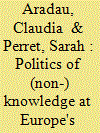| Srl | Item |
| 1 |
ID:
185784


|
|
|
|
|
| Summary/Abstract |
From statistical calculations to psychological knowledge, from profiling to scenario planning, and from biometric data to predictive algorithms, International Relations scholars have shed light on the multiple forms of knowledge deployed in the governing of populations and their political effects. Recent scholarship in critical border and security studies has drawn attention to ‘the other side of knowledge’ and has developed a vibrant conversation with the emergent interdisciplinary field of ignorance studies. This article proposes to advance these conversations on governing through non-knowledge by nuancing the analysis of power/(non-)knowledge/subjectivity relations. Firstly, we expand the analysis of non-knowledge by attending to the problematisation of errors and fakes in controversies at Europe's borders. Errors have emerged in relation to border actors’ practices and technologies, while migrant practices, documentation, and narratives are deemed to be potentially ‘fake’, ‘fraudulent’, or ‘false’. Secondly, we explore how different subjectivities are produced through regimes of error/truth and fake/authenticity. We argue that there are important epistemic differences between ‘fake’ and ‘error’, that they are entangled with different techniques of power and produce highly differentiated subjectivities. Finally, we attend to how these subjectivities are enacted within racialised hierarchies and ask whether non-knowledge can be mobilised to challenge these hierarchies.
|
|
|
|
|
|
|
|
|
|
|
|
|
|
|
|
| 2 |
ID:
148327


|
|
|
|
|
| Summary/Abstract |
‘Non-knowledge’ is a classical sociological term introduced into sociology most prominently by Georg Simmel. Dismissing classical sociological concepts as ‘zombie categories’, Ulrich Beck turned to non-knowledge relatively late in his career. This article argues provocatively that many of Beck’s observations on issues ranging from the uninsurability of modern risks to the notion of risk itself would have greatly profited from being complemented or even substituted by a theory of not knowing. Viewed in this light, Beck’s notion of risk no longer applies to the world he describes and thus has become one of his own zombie categories. The article then takes up some of Beck’s unfinished attempts at conceptualizing the unknown and develops them further so that they might prove useful for security studies and related fields today. To illustrate this approach, the article uses examples of non-knowledge on matters ranging from potential terrorist attacks to issues of human health and security.
|
|
|
|
|
|
|
|
|
|
|
|
|
|
|
|